
Paradise Regained is a poem by English poet John Milton, first published in 1671. The volume in which it appeared also contained the poet's closet drama Samson Agonistes. Paradise Regained is connected by name to his earlier and more famous epic poem Paradise Lost, with which it shares similar theological themes; indeed, its title, its use of blank verse, and its progression through Christian history recall the earlier work. However, this effort deals primarily with the temptation of Christ as recounted in the Gospel of Luke.

Matthew 3:16 is the sixteenth verse of the third chapter of the Gospel of Matthew in the New Testament. Jesus has just been baptized by John the Baptist and the Holy Spirit comes to him like a dove.

Matthew 3:17 is the seventeenth verse of the third chapter of the Gospel of Matthew in the New Testament. Following Jesus' baptism by John the Baptist, a voice from heaven states that Jesus is "God's beloved son".

Matthew 4:1 is the first verse of the fourth chapter of the Gospel of Matthew in the New Testament. This verse opens the section in Matthew dealing with the temptation of Christ by Satan. Jesus has just been baptized by John the Baptist; in this verse he is led out into the wilderness.

Matthew 4:2 is the second verse of the fourth chapter of the Gospel of Matthew in the New Testament. This verse is just preceding the section in Matthew dealing with the temptation of Christ by Satan. Jesus has been led out into the wilderness, and in this verse he fasts.
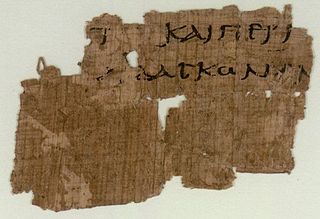
Matthew 4 is the fourth chapter of the Gospel of Matthew in the New Testament of Christian Bible. Many translations of the gospel and biblical commentaries separate the first section of chapter 4 from the remaining sections, which deal with Jesus' first public preaching and the gathering of his first disciples.
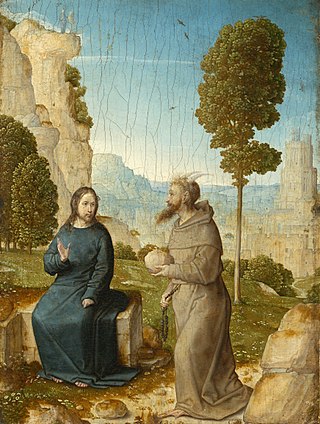
Matthew 4:4 is the fourth verse of the fourth chapter of the Gospel of Matthew in the New Testament. Jesus, who has been fasting in the desert, has just been tempted by Satan to make bread from stones to relieve his hunger, and in this verse he rejects this idea.
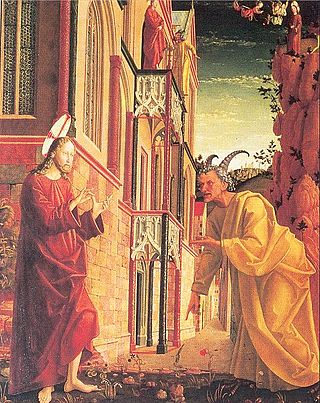
Matthew 4:5 is the fifth verse of the fourth chapter of the Gospel of Matthew in the New Testament. Jesus has just rebuffed Satan's first temptation, and in this verse the devil transports him to the site of the second temptation.

Matthew 4:6 is the sixth verse of the fourth chapter of the Gospel of Matthew in the New Testament. Jesus has just rebuffed "the tempter's" first temptation; in this verse, the devil presents Jesus with a second temptation while they are standing on the pinnacle of the temple in the "holy city" (Jerusalem).

Matthew 4:7 is the seventh verse of the fourth chapter of the Gospel of Matthew in the New Testament. Satan has transported Jesus to the pinnacle of the Temple of Jerusalem and told Jesus that he should throw himself down, as God in Psalm 91 promised that no harm would befall him. In this verse, Jesus quotes scripture to rebuff the devil.
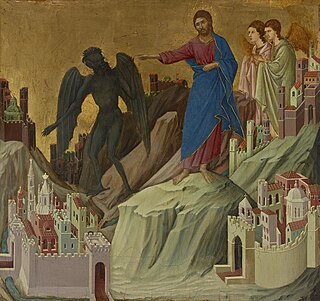
Matthew 4:8 is the eighth verse of the fourth chapter of the Gospel of Matthew in the New Testament. Jesus has just rejected Satan's second temptation. In this verse the devil transports Jesus to a new location for the third temptation.
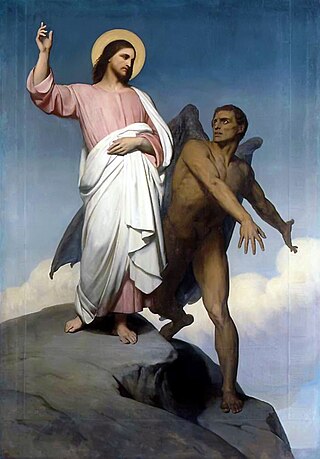
Matthew 4:9 is the ninth verse of the fourth chapter of the Gospel of Matthew in the New Testament. It is part of the Temptation of Christ narrative. Jesus has rebuffed two earlier temptations by Satan. In this verse, Satan offers control of the world to Jesus if he agrees to worship him.
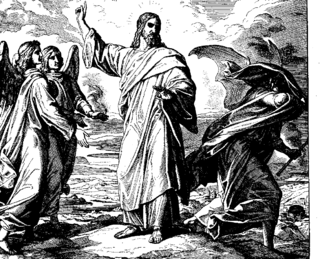
Matthew 4:10 is the tenth verse of the fourth chapter of the Gospel of Matthew in the New Testament. Jesus has rebuffed two earlier temptations by Satan. The devil has thus transported Jesus to the top of a great mountain and offered him control of the world to Jesus if he agrees to worship him. In this verse, Jesus rejects this temptation.

Matthew 4:11 is the eleventh verse of the fourth chapter of the Gospel of Matthew in the New Testament. Jesus has just rebuffed Satan's third temptation and ordered him away. In this last verse of the temptation scene, the devil departs and Jesus is serviced by angels.

Matthew 4:12 is the twelfth verse of the fourth chapter of the Gospel of Matthew in the New Testament. The temptation scene has just ended, and this verse begins the introduction to the discussion of the Ministry of Jesus, which makes up the bulk of the gospel narrative. Jesus' ministry in Galilee extends from this verse as far as Matthew 18:35.

Matthew 5:1 and Matthew 5:2 are the first two verses of the fifth chapter of the Gospel of Matthew in the New Testament. The verses introduce the Sermon on the Mount that will be recited in the next several chapters. The previous chapter concluded with large crowds "from Galilee, and from the Decapolis, Jerusalem, Judea, and beyond the Jordan" who followed Jesus to witness him healing: these verses present Jesus as seeing the crowds and going up onto a mountain to begin teaching.

The temptation of Christ is a biblical narrative detailed in the gospels of Matthew, Mark, and Luke. After being baptized by John the Baptist, Jesus was tempted by the devil after 40 days and nights of fasting in the Judaean Desert. At the time, Satan came to Jesus and tried to tempt him. Jesus having refused each temptation, Satan then departed and Jesus returned to Galilee to begin his ministry. During this entire time of spiritual battle, Jesus was fasting.
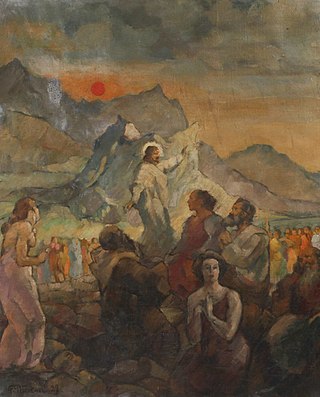
Matthew 5:35 and Matthew 5:36 are the thirty-fifth and thirty-sixth verses of the fifth chapter of the Gospel of Matthew in the New Testament. They are part of the Sermon on the Mount. These verses are part of either the third or fourth antithesis, the discussion of oaths. Jesus tells his listeners in Matthew 5:34 "to not swear oaths" and in here presents examples of swearing oaths. In context, this passage refers not to the modern understanding of cursing or using foul language, but rather, the act of swearing oaths and making promises.

Luke 4 is the fourth chapter of the Gospel of Luke in the New Testament of the Christian Bible, traditionally attributed to Luke the Evangelist, a companion of Paul the Apostle on his missionary journeys. This chapter details Jesus' three temptations, the start of his "Galilean Ministry", and his rejection at Nazareth, which Luke contrasts with his acclaim in nearby Capernaum.

Matthew 7:9 is the ninth verse of the seventh chapter of the Gospel of Matthew in the New Testament and is part of the Sermon on the Mount. This verse presents the first of a pair of metaphors explaining the benefits of prayer.




















